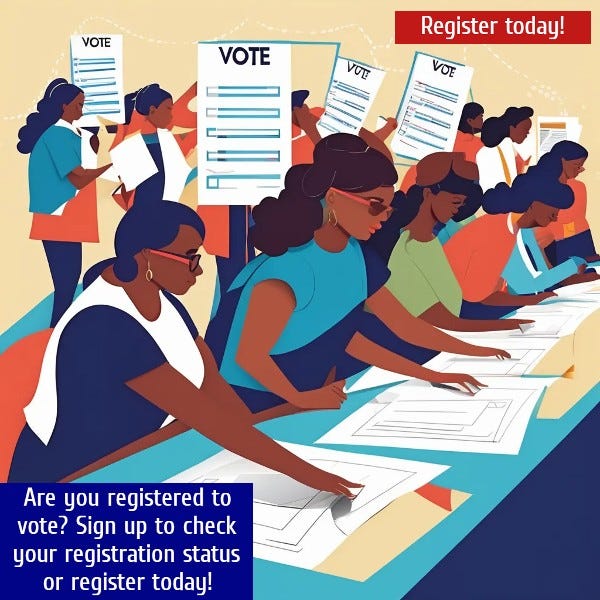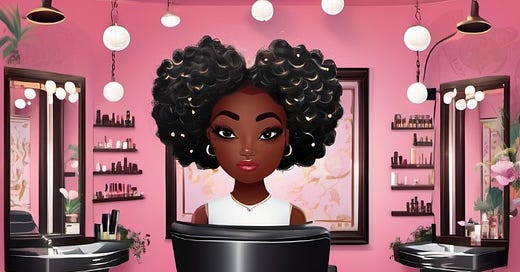If you're not a black woman, don't tell us how to vote!
We don't need a poll; we live in women's bodies and black bodies all day long.
Shortly after explaining how I wanted my new haircut to look, I offhandedly mentioned voter registration and then-Senator Barack H. Obama to my beautician.
Her response, “I haven’t decided who I’m voting for — or if I am voting at all.”
The idea that this woman — who mirrored my complexion, height and build, and who I’d conversed with on multiple occasions before my prior beautician quit — would vote for Arizona Senator John McCain and his running mate Sarah Palin just was not a consideration for me. She’d mentioned how she was thinking of quitting the beauty industry because she made more money doing manual labor for an American car manufacturer. I wondered if she knew about McCain’s foreign car collection or the ad from the United Auto Workers.
After her statement, I wanted to just pay her for the wash and conditioning, and march right out of the beauty salon with wet hair. But I stayed and kept my mouth shut. I wanted a good haircut and didn’t want to risk arguing about politics with a woman holding scissors.
ADVERTISEMENT ~ Amazon
As an Amazon affiliate, I earn a percentage from purchases with my referral links. I know some consumers are choosing to boycott Amazon for its DEI removal. However, after thinking about this thoroughly, I want to continue promoting cool products from small businesses, women-owned businesses and (specifically) Black-owned businesses who still feature their items on Amazon. As of the first date of Black History Month 2025, each new post will ALWAYS include a MINIMUM of one product sold by a Black-owned business. (I have visited the seller’s official site to verify that Amazon Black-owned logo.) I am (slowly) doing this with older, popular posts too. If you still choose to boycott, I 100% respect that decision.


I don’t know how she ended up voting. She kept her word, quit that beauty salon and went back to her primary job on the auto assembly line. And then black women dominated the vote for Obama (96% of black women supported Obama and constituted 13% of the electorate) in 2008 anyway. In 2012, he got 96% of black women’s votes again.
When former Senator Hillary Clinton ran for president (losing to Obama in the 2008 primary but fighting her way back to the ballot against Donald Trump in 2016), 94% of Black women voters supported her in the 2016 presidential election.

In 2016, Asian-American voters (79%) voted for Clinton too. Meanwhile, 52% of white women and 25% of Latinos supported Trump.
By 2020, 90% of Black women voted for President Joe Biden, making us his biggest supporters compared to other women voters and other minority groups. (Running mate Kamala Harris could have been a deciding factor for some.)
Recommended Read: “48 hours after Biden wins, black women get shunned again — Eva Longoria, know your stats before you dismiss black women”
With stats like these, I’m puzzled when someone will contact me on social media and start telling me how “women of color” should vote for the Democrat. And it sounds even crazier coming from someone who is neither a woman nor black (nor a “person of color”) but is telling me (a black woman) about what black women care about when it comes to politics.
Black women live in our bodies all day long. We’ve historically allowed our vote to mirror women’s rights and minority rights. Pre- and post-Palestinian genocide in Gaza*, I’ve still yet to run into any black woman in my social circle who would consider voting for Trump.
So this need to teach us how to vote is insulting. We’re historically always taking notes on what politicians are doing because it affects us financially, socially, morally and health wise before it hits anyone else. Sometimes we identify a satisfying choice on the ballot; other times we settle for the guy (and a couple women) we can stomach the most.
Granted, there may be someone like my old beautician who may vote against the majority opinion. And black women may run into some tough decisions, especially with presidents making completely moronic financial decisions that could get more kids killed. But in the grand scheme of things, if white voters want more Biden supporters, they need to take up their anti-Trump voting lectures with fellow white men and women who supported Trump as a president. Twice!




